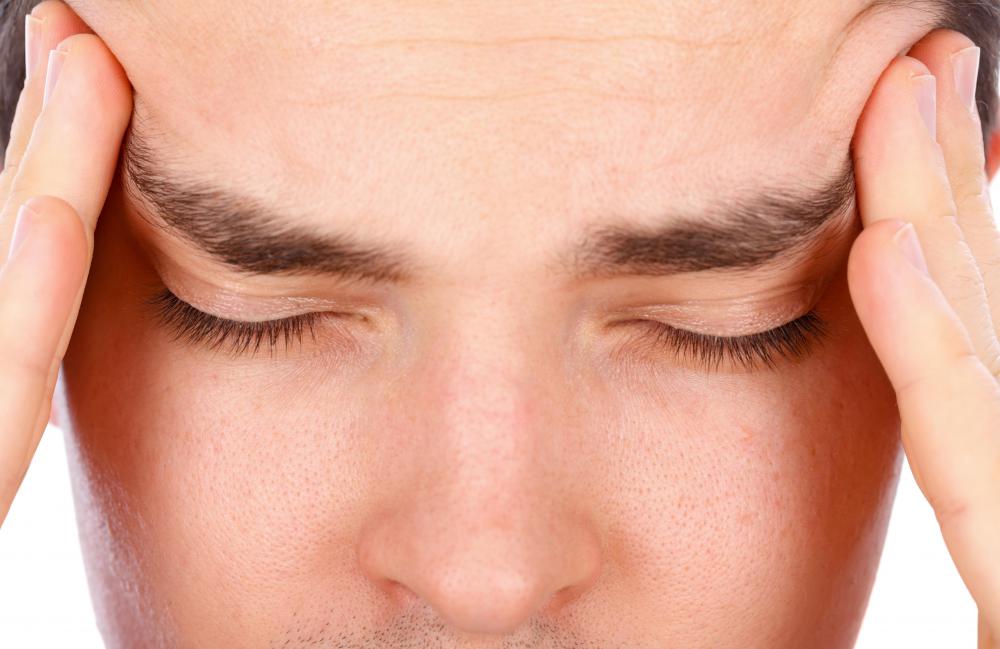At WiseGEEK, we're committed to delivering accurate, trustworthy information. Our expert-authored content is rigorously fact-checked and sourced from credible authorities. Discover how we uphold the highest standards in providing you with reliable knowledge.
What Are the Potential Sorbitol Side Effects?
Dehydration and minor digestive distress tend to be the most common sorbitol side effects, though the complete list of possibilities also includes things like prolonged constipation, dizziness and weakness, and severe allergic reaction. Side effects aren’t common people who use the additive only seldomly, or who consume foods and drinks that contain it in small amounts. In these cases it’s often hard to pinpoint sorbitol as a specific cause, since so many different additives and ingredients can cause similar mild effects. People with true allergies to the substance can experience reactions to even trace amounts, but in general, the most serious cases usually involve prolonged periods of extensive consumption. It is for this reason that most medical professionals recommend using this and other additives in moderation and as part of an otherwise balanced diet.
Understanding Sorbitol Generally

Sorbitol is a sugar compound that is often marketed as a dietary sweetener since it is more concentrated and has a more complex structure than ordinary glucose sugar. This means that people can use less of it to achieve the same sweetness, and their bodies also have to work a little harder to break it down, thus burning more calories and decreasing net consumption in the process.

The compound carries the chemical formula C6H1406, and is sometimes also known as glucitol. It is technically a sugar alcohol, and though it’s usually created synthetically in labs for mass production and extraction, it does occur naturally. Stone fruits including plums, peaches, and some cherries are good sources, and most varieties of apples contain it, too. It’s usually really hard for people to consume enough from nature to experience side effects. Negative reactions typically only occur in people who consume a lot of the concentrated extract, usually in the form of sweetener intentionally added to foods and beverages.
Dehydration

One of the most common sorbitol side effects is dehydration. While dehydration can manifest itself in a number of ways, when associated with sorbitol use, it most commonly results in a decrease in urination and the development of dry mouth. When left untreated for a significant period of time, dehydration can lead to painful headaches and serious muscle cramps. Those who have incorporated sorbitol into their diets and have experienced these symptoms may want to consult with their physician, though it’s often the case that simply switching sweeteners will resolve the issue.

In some cases, people using a lot of sorbitol might also experience an increased increased rate of urination. This usually happens because sorbitol can act as a diuretic, increasing urine output and ridding the body of water faster than normal. This can make travel and other activities very difficult. Individuals who experience pain during urination or who feel the need to urinate more than two or three times an hour should consider discontinuing sorbitol use. Increases in urine output may also be indicative of other serious conditions. If the problem doesn’t resolve itself, people are usually wise to get a medical evaluation.
Digestive Troubles

A range of minor digestive troubles are also on the list of possible side effects. This can include everything from stomach cramps and nausea to vomiting and diarrhea. In most cases the symptoms come and go, and don’t usually interfere with everyday life for more than a day or so. People who experience debilitating pain or an inability to keep anything down should usually get medical help, and should certainly discontinue their use of sorbitol and other dietary supplements while waiting for a diagnosis.
Prolonged Constipation

Sorbitol is often thought of as sort of a natural laxative; it’s a key natural ingredient in prunes, for instance, and is often used in commercial products to help stimulate bowel movements. The sugar compound is effective in this respect as it is usually able to draw water out of the large intestine, thus firming the stool and prompting its movement. Too much sorbitol or sorbitol in very high concentrations can actually have the opposite effect, though. If the stool becomes too hard and firm, it might become very difficult to pass. Constipation is usually only a side effect of excessive use, but it’s something for consumers to be aware of.
Dizziness and Weakness

General feelings of weakness and dizziness sometimes also accompany sorbitol use. These effects aren’t usually serious and are usually the most profound immediately after the sweetening agent enters the bloodstream. Standing up very quickly can also exacerbate the effects.
Allergic Reactions
Some individuals may experience an allergic reaction to sorbitol. Symptoms of a severe allergic reaction include chest tightness or pain, nausea, shortness of breath, and blurry vision. These symptoms are quite serious, and generally require immediate medical attention. Failure to receive treatment can result in coma or possible death. Patients who experience an allergic reaction should alert their physician to avoid being prescribed any medications that may contain sorbitol, as it is a common additive in many medications.
AS FEATURED ON:
AS FEATURED ON:

















Discuss this Article
Post your comments